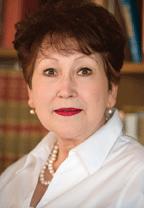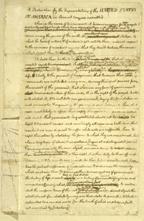
Thrown together by the circumstances of place and time, both Jewish and non-Jewish colonists showed solidarity in breaking with the British. Their impassioned goal for a free nation was advanced by unmitigated commitment and bold actions.
With the Declaration of Independence, the colonists seized the opportunity to start life fresh. Thomas Jefferson’s emblematic words confirmed that the patriots were unified and visionary: “When in the course of human events it becomes necessary for one people … to assume … the separate and equal station to which the Laws of Nature and of Nature’s God entitle them….” Jefferson articulated the fundamental principle for being governed: “We hold these truths to be self evident…. it is the Right of the People to alter or to abolish it [a government that is destructive], and to institute new Government….”
The American Jewish experience involved patriots who defined themselves within the context of the cause of independence and sacrifice. They risked their lives fighting in the state militias and the national army, and jeopardized their finances to support the war effort. Solomon Pinto dedicated himself to the fight by serving as an officer in the Connecticut militia and was wounded in the British attack on New Haven in July 1779. Pinto and others who fought in the rebellion founded the Society of the Cincinnati, our nation’s oldest patriotic organization. Haym Salomon was both an activist patriot and an agent for the government’s Office of Finance. Salomon sold coins, bills of credit, and notes; all were indispensible aids to the government. When the government’s coffers were depleted, he extended personal loans to its leaders. The British imprisoned Salomon because he successfully convinced mercenary fighters to switch to the American side.

Jewish women were patriots in their own right. Jewish women had historically partnered with their husbands to financially support their families and they did so throughout the rebellion. They kept family businesses open or worked for wages while their husbands and sons fought in the war. Their families were not, consequently, financially destitute and dependent on others. Abigail Minis, a widow with eight children, was widely known for supporting the Revolutionary cause. Using her business acumen, she improved her family’s finances while at the same time she supplied provisions for the Georgia militia, the French forces, and the national army. Frances Hart, though born in the Netherlands, longed for and sought a better future in the New World. In Georgia, she met and married Mordecai Sheftall where they raised a family. The British captured her husband and their son, who were rebel fighters, at the fall of Savannah. She and her four other children escaped to Charleston where it was her responsibility to find lodging and support her family. Sheftall earned wages by taking in hand stitching, and clothes to be washed and ironed. No matter her life’s circumstances, Sheftall was a practicing Jewess who maintained a kosher household.
Originally from far-flung countries, the Jewish Sephardic and Ashkenazic immigrants organized themselves into a community centered on their faith. The hope and promise for religious freedom inspired them. They took substantial risks to establish congregations by donating and raising funds to construct the first synagogues in the colonies. In Savannah, Mordecai Sheftall determinedly led the effort to re-establish the Mickve Israel synagogue and donated the land for a Jewish cemetery. Zipporah Nunes fled from Lisbon to England to evade being re-interrogated by the Inquisition for suspicion of being a secret Jew. The Nunes family fled the Old World with hopes of religious freedom in the colonies. As a result, they were among the first group of Jews to settle in Georgia. Zipporah Nunes married a member of the Jewish clergy and maintained an observant Jewish home. Jews in the colonies recognized that being patriots and practicing Judaism went hand in hand.
We citizens must embrace the characteristics of the patriots in this difficult to ignore election year. Jewish patriots exemplified the characteristics of being leaders in their own lives. They identified what was important and concentrated their efforts with hope but not pessimism, they believed in their own usefulness for important causes, they focused on their strengths rather than on blaming others for problems, and they were resourceful in times of crisis.
We cherish the legacy of the Jewish patriots and the ideals of the Declaration of Independence. We must, therefore, not allow the very real threats to American society, such as the power of fear, blaming, quick fix mindsets, uncompromising self-interests, and toxic language, to seize and imprison our collective conscience.
Mary Greenberg, Ph.D. serves on the State of Kansas Holocaust Commission. Her speaking engagements on preventing anti-Semitism, and the link between anti-Semitism and leadership are based on her research that advances the study of the Jewish people in the Diaspora.